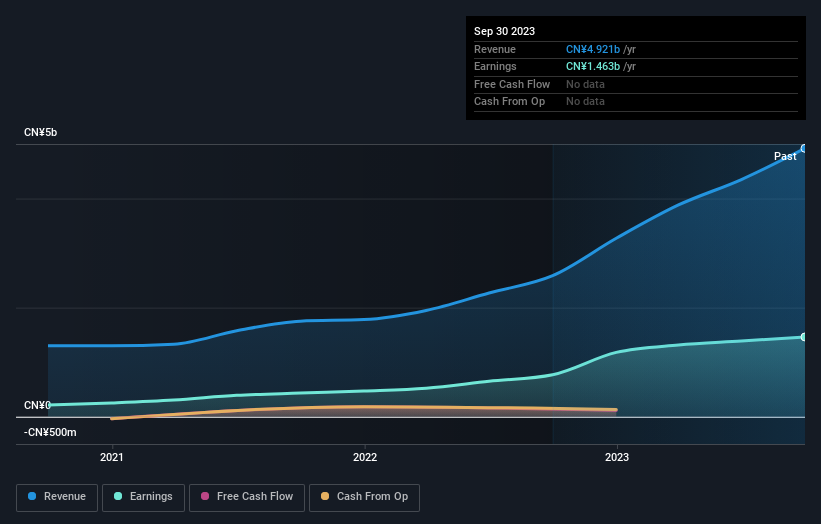Jiayin Group Inc. (NASDAQ:JFIN) insiders have significant skin in the game with 64% ownership
Key Insights
Significant insider control over Jiayin Group implies vested interests in company growth
51% of the company is held by a single shareholder (Dinggui Yan)
Using data from company's past performance alongside ownership research, one can better assess the future performance of a company
To get a sense of who is truly in control of Jiayin Group Inc. (NASDAQ:JFIN), it is important to understand the ownership structure of the business. With 64% stake, individual insiders possess the maximum shares in the company. That is, the group stands to benefit the most if the stock rises (or lose the most if there is a downturn).
With such a notable stake in the company, insiders would be highly incentivised to make value accretive decisions.
Let's delve deeper into each type of owner of Jiayin Group, beginning with the chart below.
Check out our latest analysis for Jiayin Group
What Does The Lack Of Institutional Ownership Tell Us About Jiayin Group?
Institutional investors often avoid companies that are too small, too illiquid or too risky for their tastes. But it's unusual to see larger companies without any institutional investors.
There are many reasons why a company might not have any institutions on the share registry. It may be hard for institutions to buy large amounts of shares, if liquidity (the amount of shares traded each day) is low. If the company has not needed to raise capital, institutions might lack the opportunity to build a position. Alternatively, there might be something about the company that has kept institutional investors away. Institutional investors may not find the historic growth of the business impressive, or there might be other factors at play. You can see the past revenue performance of Jiayin Group, for yourself, below.
Hedge funds don't have many shares in Jiayin Group. The company's CEO Dinggui Yan is the largest shareholder with 51% of shares outstanding. With such a huge stake, we infer that they have significant control of the future of the company. It's usually considered a good sign when insiders own a significant number of shares in the company, and in this case, we're glad to see a company insider with such skin in the game. Meanwhile, the second and third largest shareholders, hold 11% and 1.5%, of the shares outstanding, respectively. Interestingly, the third-largest shareholder, Yifang Xu is also a Member of the Board of Directors, again, indicating strong insider ownership amongst the company's top shareholders.
While studying institutional ownership for a company can add value to your research, it is also a good practice to research analyst recommendations to get a deeper understand of a stock's expected performance. We're not picking up on any analyst coverage of the stock at the moment, so the company is unlikely to be widely held.
Insider Ownership Of Jiayin Group
The definition of an insider can differ slightly between different countries, but members of the board of directors always count. Management ultimately answers to the board. However, it is not uncommon for managers to be executive board members, especially if they are a founder or the CEO.
Insider ownership is positive when it signals leadership are thinking like the true owners of the company. However, high insider ownership can also give immense power to a small group within the company. This can be negative in some circumstances.
It seems that insiders own more than half the Jiayin Group Inc. stock. This gives them a lot of power. That means they own US$179m worth of shares in the US$278m company. That's quite meaningful. Most would be pleased to see the board is investing alongside them. You may wish todiscover (for free) if they have been buying or selling.
General Public Ownership
With a 35% ownership, the general public, mostly comprising of individual investors, have some degree of sway over Jiayin Group. This size of ownership, while considerable, may not be enough to change company policy if the decision is not in sync with other large shareholders.
Next Steps:
While it is well worth considering the different groups that own a company, there are other factors that are even more important.
I like to dive deeper into how a company has performed in the past. You can access this interactive graph of past earnings, revenue and cash flow, for free.
Of course this may not be the best stock to buy. Therefore, you may wish to see our free collection of interesting prospects boasting favorable financials.
NB: Figures in this article are calculated using data from the last twelve months, which refer to the 12-month period ending on the last date of the month the financial statement is dated. This may not be consistent with full year annual report figures.
Have feedback on this article? Concerned about the content? Get in touch with us directly. Alternatively, email editorial-team (at) simplywallst.com.
This article by Simply Wall St is general in nature. We provide commentary based on historical data and analyst forecasts only using an unbiased methodology and our articles are not intended to be financial advice. It does not constitute a recommendation to buy or sell any stock, and does not take account of your objectives, or your financial situation. We aim to bring you long-term focused analysis driven by fundamental data. Note that our analysis may not factor in the latest price-sensitive company announcements or qualitative material. Simply Wall St has no position in any stocks mentioned.


